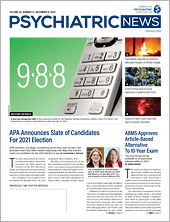The informative articles on the extensive racism in APA history include many illustrations of what the American Historical Association has criticized as presentism—judging past events in terms of modern values and concepts.
Today the importance of sociocultural forces seems so evident that we cannot imagine that in the second half of the 19th century, research in psychiatry was limited to what could be studied in the pathology laboratory. Comparison of Black and White brains was but one element of a multi-decade unproductive effort, later characterized by historians as “brain mythology.”
In 1945, when APA adopted standards for psychiatric hospitals, “they did not specify that psychiatric hospitals should be integrated.” The standards document was about staffing patterns and clinical procedures, not with social context. Integration had not yet come to the Armed Forces. It was in 1950 that a new generation of APA leaders published The Social Responsibility of Psychiatry, setting the stage for major changes in the breadth of our profession.
It is incorrect to say that “APA and its members were contributing to prejudice and discrimination not only against Blacks, but also against anyone with psychiatric or neurologic symptoms that psychiatrists said made them ‘degenerates.’ ” In 1857, in Traite des Degenerescences Benedict Morel theorized that deviations from man’s original perfection were caused by toxins, such as alcohol, tobacco, opium, and dissolute living. Once initiated, each generation would be more severely impaired. Morel’s concept of degeneracy was universally accepted by the scientific community. It was not name calling. In the 20th century, with a new definition, a broadened concept of degeneracy became a rationale for eugenic sterilization and genocide. Today a degenerate is an immoral or corrupt person.
“No member of the Association [in 1845] asked for an explanation” about the reason that they did not admit colored patients to an asylum in Virginia. Here is an alternate presentist view: The members, 11 from the North and two from the South, despite their differing convictions, worked together for “the welfare of the insane.”
Surely we can move forward and do what is right without belittling those who came before us. ■
HENRY PINSKER, M.D.
Pompton Plains, N.J.
APA President Jeffrey Geller, M.D., M.P.H., responds:
I thank Dr. Pinkser for his comments and taking the time to write. As a person with great respect for those in our profession who preceded us, there is no intention to belittle their work. However, the course of history moves in a positive direction only when men and women have the insight and courage to follow their conscience and work toward change that is apparent to them. I believe that APA is now at that point in its history, and together we can work to eradicate racism wherever it occurs within our Association and profession.
